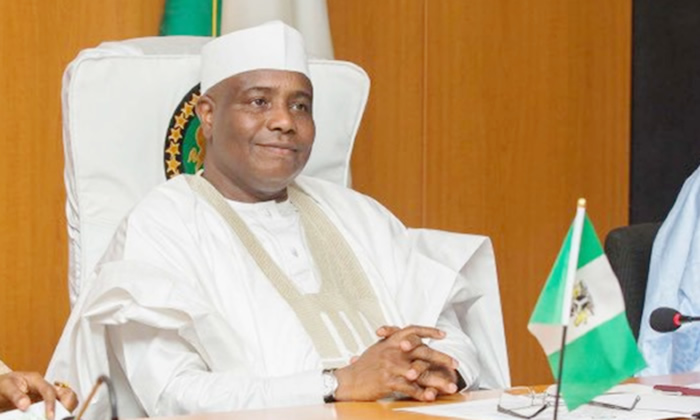Paragraph 1: In a recent address to the Sokoto Peoples Democratic Party congress, former Governor Aminu Tambuwal has issued a clarion call to leaders across Nigeria, urging them to come together to prevent the nation from spiraling into collapse. Tambuwal, now a senator representing the Sokoto South Senatorial District, remarked on the critical state of the country, which he likened to a patient in the Intensive Care Unit, highlighting the alarming levels of insecurity, poverty, and economic malaise that plague Nigerian society. He criticized current governance for its harsh economic policies, stating that these have plunged citizens into deep suffering and expressed the necessity for unity among leaders who are dissatisfied with the country’s current direction.
Paragraph 2: Expounding on the nature of the crisis facing Nigeria, Tambuwal emphasized that it is essential for leaders to collaborate in reclaiming the nation from those who exacerbate its struggles. He noted that the socio-economic climate in Nigeria is deeply troubling, with rising insecurity and poverty rates negatively impacting the populace. Suggesting a collective responsibility, he urged leaders to set aside differences and work collaboratively towards a diverse and progressive future for the country, particularly in anticipation of the 2027 elections. He believes that a unified approach can rejuvenate the nation’s path toward unity, progress, and development.
Paragraph 3: In stark contrast to Tambuwal’s assessment of the country, a legislative aide to Deputy Senate President Ado Garba shared an optimistic perspective regarding the political climate under President Bola Tinubu’s administration. Speaking in Kano, Garba expressed confidence that, despite ongoing criticisms of the government’s reform policies, President Tinubu will likely secure a landslide victory in the upcoming 2027 presidential elections. Garba attributed this optimism to the goodwill enjoyed by the people of Kano due to the various development initiatives led by Senator Barau Jibrin, the deputy president of the Senate, which he believes have positively influenced public opinion.
Paragraph 4: Garba detailed the practical benefits derived from Senator Jibrin’s initiatives, which include empowerment programs for women and youth, scholarship opportunities, and infrastructural improvements within Kano North Senatorial District. He explained that these efforts have ostensibly made a significant impact on local constituents, adding credence to the idea that these programs will influence electoral behavior. Garba contended that the achievements fostered by Jibrin’s leadership, in conjunction with what he perceives to be Tinubu’s realistic and patriotic policy reforms, will galvanize widespread support for the incumbent president in the forthcoming elections.
Paragraph 5: In examining the landscape of Nigerian politics, one observes a growing divide between different political ideologies and the responses to the government’s current approach. While Tambuwal beckons for unity among leaders and citizens regarding the need for change, Garba’s statements highlight a confidence in the status quo under Tinubu’s administration. This disparity in perspectives illustrates a dynamic political environment where some leaders advocate for drastic reforms to address systemic issues, while others promote continuity and convey optimism about existing government initiatives that they argue will yield favorable outcomes in the electoral process.
Paragraph 6: The contrasting views presented by Tambuwal and Garba reflect the broader complexities facing Nigeria in the realm of governance and development. As concerns around insecurity and economic hardship continue to escalate, the call for unity among leaders becomes increasingly crucial. Their differing viewpoints underscore the need for a robust political dialogue that transcends partisan divides, as the nation gears up for a consequential election cycle. Ultimately, the path forward for Nigeria may depend on whether leaders can embrace a collaborative spirit that prioritizes the well-being of the citizenry above individual ambitions, creating a cohesive effort to address the pressing challenges that lie ahead.














